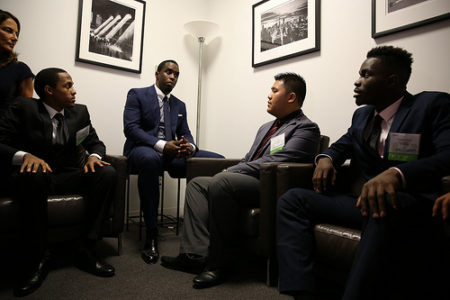
Mentorship is a personal developmental relationship in which a more experienced or more knowledgeable person helps to guide a less experienced or less knowledgeable person. The mentor may be older or younger, but have a certain area of expertise. It is a learning and development partnership between someone with vast experience and someone who wants to learn.
Money on Books and its partners in law enforcement has dedicated themselves to the betterment of our society, and has come up with a plan to eradicate ignorance to policing. Please don’t assume “ignorance” is a bad word. We as a diverse culture is ignorant when it comes to the many diversities and cultures of our society.
We at Money on Books believe the best keepers of public order are those who best understand the public their keeping safe.
Money on Books recruitment program allows every community to take charge of their “own”. Who’s more knowledgeable than the youth who grew up in their own communities
Inner City Youth

Nearly all young people—98.6 percent—hold at least one job between the ages of 18 and 25.1 The average young person holds 6.3 jobs between 18 and 25.2 Some work part-time or summers only, while others see full-time permanent employment as their path to economic independence.
Employment can be beneficial for youth by teaching responsibility, organization, and time management and helping to establish good work habits, experience, and financial stability.
There are many advantages to working during high school, especially for low-income youth, including higher employment rates and wages in later teen years and lower probabilities of dropping out of high school.
Knowing how to find and keep a job is not only critical for admission to the adult world but also is an important survival skill for which there is little in the way of formal, structured preparation.
Mentoring is not a new concept or practice. History abounds with examples of professional mentoring. Mentor was the name of the man charged with providing wisdom, advice and guidance to King Odysseus’ son in Homer’s, The Odyssey. During the Middle Ages, boys served as apprentices to masters in a craft or trade while gaining skills to eventually qualify as a journeyman, and finally, as a master. During this time, the mentoring relationship ensured the continuity and quality of the craft being handed down to the next generation.
The modern concept of Mentoring, that has recently been used to effectively recruit and retain new employees in business and academic institutions, provides law enforcement with an opportunity to engage and anchor new employees at a time when industry competition for those employees is at an all-time high.
Mentoring Benefits for Mentors
- Mentors are personally rewarded for spotlighting and developing talent.
- Mentors must be knowledgeable of department policies, procedures, and contemporary policing practices.
- Mentors pave the way for others, thereby leaving their legacy in the department.
- Mentors are viewed as valuable in the organization and are respected by colleagues.
- Mentors obtain varying perspectives from their protégés, which generates creativity.
- Mentors “get by giving.”
![police-community-relations-300x201[1]](https://www.moneyonbooks.org/wp-content/uploads/2017/01/police-community-relations-300x2011.jpg) Frequently, people become mentors because they were previously protégés who experienced the rewards of a mentoring relationship. Others become mentors because they wish a mentor had been available to them during their career. Whatever the reasons, mentors derive great satisfaction from seeing a colleague succeed because of their efforts.
Frequently, people become mentors because they were previously protégés who experienced the rewards of a mentoring relationship. Others become mentors because they wish a mentor had been available to them during their career. Whatever the reasons, mentors derive great satisfaction from seeing a colleague succeed because of their efforts.
Mentoring Relationship Goal:
- To promote professional growth,
- Inspire personal motivation,
- Enhance effectiveness of police service
Mentoring Benefits for Protégés
- Increases likelihood for success. Mentors help protégés gain competency and avoid failure.
- Assists protégés in setting goals and charting career paths.
- Encourages and provides opportunities for new experiences and professional growth.
- Helps the protégé avoid pitfalls and learn through real-life examples.
- Enhances the protégés’ feeling of worth to the mentor and the organization.
- Encourages self-confidence by cheering protégé achievements.
Many successful people attribute their achievements to a mentoring relationship. Many “repay” their debt to the mentor and the organization by becoming future mentors. When mentoring begins with new employees, it is the first step toward institutionalizing mentoring in the department.
Formal Versus Informal Mentoring

Some police organizations have implemented new-hire mentoring programs as a method of reducing employee turnover. While others have chosen the more frequent method of informal mentoring. Examples of informal mentoring have occurred throughout the history of policing. Typically, a veteran officer encourages friends or acquaintances to apply for positions in their department. As a result, there is a natural tendency for the veteran officer to encourage, support and give information to his or her friend during the hiring and training period. This informal mentoring relationship provides an advantage to the new employee by helping them too feel connected to the new department.
The best reason for creating a formal process is that it affords every employee the opportunity and benefit of mentoring and promotes loyalty and inclusiveness within the organization. In addition, a formal mentoring process identifies goals, creates structure and procedures, and defines mentor/protégé roles and responsibilities. Although the program requires time to plan and initiate and requires some oversight, it often results in enhanced employee self-esteem and a “great place to work” environment. Whether launching a formal mentoring program or creating a mentoring environment in an organization, mentoring can improve and promote any leadership initiative.
Generational Benefits for Mentors
One of the most beneficial aspects of formal mentoring is how it appeals to police recruits who represent new generational needs and attitudes. In the past 15 years, law enforcement has experienced a reduction in applicant pools and higher employee turnover. In many areas of the country mentoring is having a significant impact on lowering employee turnover by anchoring the employee to the agency and by providing a formal leadership development process.
The Benefits of Formal Mentoring:
- Ensures that all inner-city youth will receive the benefits of a mentoring relationship
- Promotes Neighboring loyalty and Inclusiveness
- Identifies inner-city youth goals
- Creates program structure and procedures
- Defines mentor/protégé roles and responsibilities


